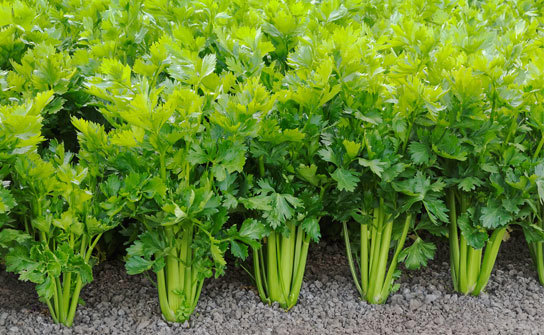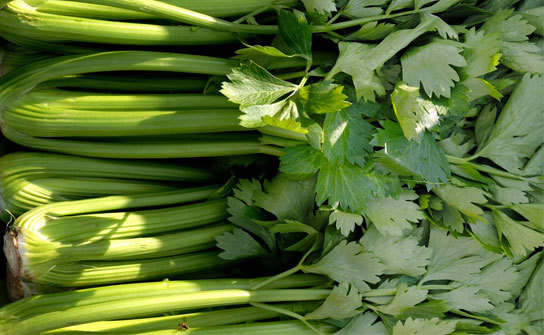 October-05-2023
October-05-2023
View: 1

Chinese Celery has Vitamin A, C & K, Dietary Fiber, and Protein. These nutrition facts are highly edible in terms of health benefits and energy fill-ups.
Chinese celery, also known as cutting celery or leaf celery, is a unique and flavorful variety of celery that adds a delightful twist to your culinary endeavors. While it may share some similarities with its Western counterpart, Chinese celery boasts distinct characteristics that set it apart. In this article, we will explore how to successfully grow Chinese celery on your farm, including the ideal season, growing conditions, harvest tips, and the numerous benefits and nutritional advantages of incorporating this green wonder into your diet.
Season and Conditions for Growing Chinese Celery
Chinese celery thrives in specific growing conditions that are relatively easy to provide, making it an excellent addition to your farm. To get started, you'll want to consider the following factors:
Season: Chinese celery prefers cooler weather for optimal growth. It is typically grown as a cool-season crop, with the best planting times in early spring or late summer. In regions with mild winters, you can also plant it during the winter months.
Sunlight: While Chinese celery can tolerate light shade, it truly shines when it receives at least 5 to 7 hours of direct sunlight each day. Aim for a spot in your garden that gets morning sun and afternoon shade for the best results.
Soil: Ensure your soil is well-drained and rich in organic matter. Chinese celery will thrive in fertile soil with a pH level between 6.0 and 6.8. Regularly amending the soil with compost can help maintain its quality.
Watering: Keep the soil consistently moist but not waterlogged. Chinese celery is sensitive to drought, so a regular watering schedule is essential, especially during dry spells.

Cultivating Chinese Celery on Your Farm
Growing Chinese celery is relatively straightforward and comes with the advantage of a shorter growing time compared to Western celery varieties. Here's a step-by-step guide to cultivating this unique vegetable:
Planting: Start Chinese celery from seeds or transplants. Sow seeds directly into the garden bed or start them indoors and transplant seedlings when they are about 6 inches tall. Space the plants 6-8 inches apart in rows with 12-18 inches between rows.
Maintenance: Keep the soil consistently moist and weed-free. Apply a balanced, all-purpose fertilizer every few weeks to ensure healthy growth. Mulching around the plants can help conserve moisture and suppress weeds.
Harvesting: Chinese celery can be harvested when the leaves are approximately 6-8 inches tall. You can cut individual leaves or harvest the entire plant at once. Be sure to use a sharp knife or scissors to avoid damaging the remaining plant.
Benefits and Nutritional Value of Chinese Celery
Chinese celery offers a plethora of health benefits and a unique flavor profile that can elevate your culinary creations. Here are some of the key advantages of adding this green wonder to your diet:
Rich in Nutrients: Chinese celery is a nutritional powerhouse, packed with essential vitamins and minerals. It is an excellent source of vitamin K, which is vital for bone health and blood clotting, and vitamin C, an antioxidant that supports the immune system.
Low in Calories: If you're watching your calorie intake, Chinese celery is a fantastic choice. It's low in calories but high in flavor, making it a guilt-free addition to salads, soups, and stir-fries.
Aids Digestion: Chinese celery contains dietary fiber, which promotes healthy digestion and can help prevent constipation. The fiber content also contributes to a feeling of fullness, making it a great choice for weight management.
Anti-Inflammatory Properties: Some compounds in Chinese celery have been linked to anti-inflammatory effects, potentially reducing the risk of chronic diseases associated with inflammation.
Traditional Medicine: Chinese celery has a history of use in traditional Chinese medicine to treat various ailments. Some studies suggest that it may help lower blood pressure due to its phthalide content, which relaxes blood vessel walls.
In conclusion, growing Chinese celery on your farm can be a rewarding experience. With the right season, growing conditions, and care, you can enjoy a bountiful harvest of this flavorful and nutritious vegetable. Whether you use it in salads, soups, or as a flavorful garnish, Chinese celery is a versatile addition to your kitchen that brings a unique twist to your culinary creations while offering a host of health benefits. So, don't hesitate to give Chinese celery a try and enjoy the delicious and nutritious rewards it has to offer.
#Celery #ChineseCelery #GreenCelery #WhiteCelery